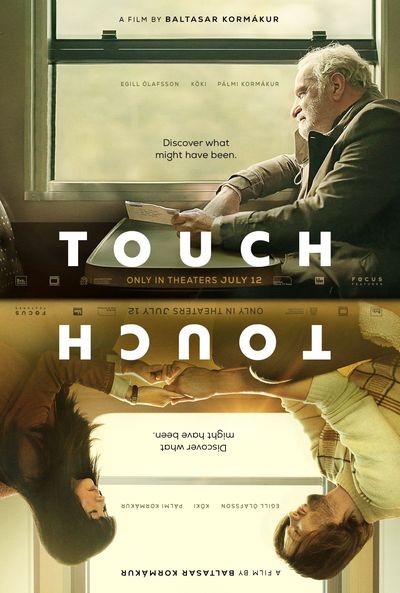Reel Rundown: ‘Touch’ touches on what might have been

As we get older, it’s only natural that we should look back in time. And so often that means recalling one-time love affairs, especially those that – for one reason or another – ended badly.
The pangs of a broken heart never completely subside.
That’s the situation facing Kristófer (Egill Ólafsson), a restaurant owner at the center of Icelandic filmmaker Baltasar Kormákur’s film “Touch.” Now in his 70s, and feeling the infirmity of his age – maybe even the prospect of dementia – Kristófer finds himself drawn to his past.
And to him, that means a particular time half a century earlier when he was a disgruntled student at the London School of Economics.
Then a self-styled anarchist, but labeled by his classmates as a communist, Kristófer (played as his younger self by Palmi Kormákur, the director’s son) had impulsively quit his studies and applied for a menial job at a Japanese restaurant. And it is there that he encounters Miko (Kôki).
If it isn’t love at first sight, it’s close. And even as he gets schooled in the ways of Japanese cooking by the strict-but-fair restaurant owner Takahashi-san (Masahiro Motoki), Kristófer finds himself being drawn closer and closer to Miko. And she to him.
The problem with all this is two-fold. One, Miko is Takahashi-san’s daughter. Two, both Takahashi-san and Miko are what the Japanese call “hibakusha,” a term that is applied to those who were affected by the atomic bombs that the U.S. dropped on Hiroshima and Nagasaki.
And for reasons that only eventually become clear, that second reason makes the biggest difference. It’s why Takahashi-san and Miko abruptly leave London, disappearing from Kristófer’s life forever.
Or at least they do for the 50-odd years that then pass by, which is the point where Kristófer goes off in search of the woman whom he clearly considers the lost love of his life.
Told in a nonlinear fashion, and based on the 2022 novel by Ólafur Jóhann Ólafsson, Kormákur’s film switches back and forth between the 1960s and present day. As it does, we learn that as time passed, Kristófer had married, though not happily, and is now a widower.
And while the film’s straightforward plotline might feel similar to your standard Hallmark movie, or anything adapted from a Nicholas Sparks novel, “Touch” has a distinct, relaxed European feel. Kormákur declines to provide the typical dramatic crescendos that your average American director would find obligatory. And the ending he opts for is pleasantly, if somberly, open-ended.
Kormákur is aided immensely by his cast, not just the veteran Icelandic actor and musical performer Ólafsson but the young Kormákur and the Japanese actors: Kôki, Motoki and Yôko Narahashi (as the older Miko).
Yet everything Kormákur puts on the screen works as well as it does largely because of our basic human tendency to reflect on the past – and dream about what might have been.